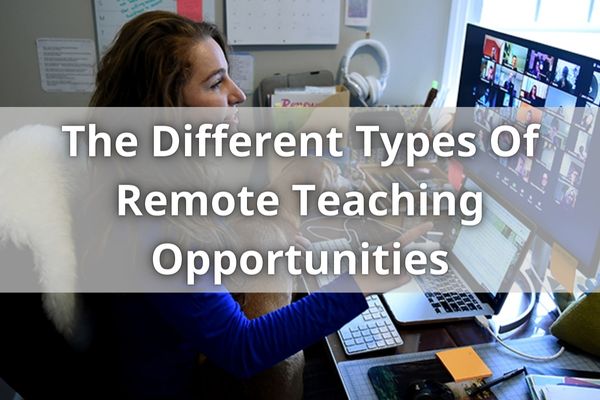Remote Teaching Careers: Opportunities, Challenges, and Tips
Remote teaching careers are an increasingly popular choice among educators today. Teachers can now reach more students faster and with less overhead than ever before because to the growth of online learning. This career is appealing to people who desire flexible hours or a better work-life balance since it allows for remote work.
This post will go through the requirements for starting a remote teaching job, including educational requirements, expected pay, perks, and more. Understanding everything involved in applying for a remote teaching job is essential whether you’re a seasoned educator trying to change the course of your career or a novice exploring a career in education.
In order to help readers choose wisely, we’ll look at how to get started and weigh the benefits and drawbacks.
Introduction
The digital age has revolutionized the education system, bringing about remote teaching careers that allow educators to teach from anywhere in the world. These new opportunities present a variety of benefits and challenges for teachers as they navigate this emerging career path.
Remote teaching can bring flexibility in both scheduling and location to educators who are looking for more freedom while still working in their chosen field. Additionally, technology offers teachers access to vast amounts of online resources which can be used to create engaging lessons and activities with ease.
However, there may also be drawbacks like feeling isolated or disconnected from colleagues due to distance. It’s important for those considering a move into remote teaching to weigh all their options carefully before making any decisions.
Essential Skills And Qualifications For Remote Teaching Careers

Remote teaching careers can offer rewarding opportunities for making a difference in the lives of students, but it also requires a unique set of skills and qualifications.
To be successful as an online teacher, you must possess:
- Academic credentials and subject matter expertise
- Digital literacy and proficiency in online teaching tools
- Strong communication and presentation skills
- Time management and self-motivation
In addition to these technical abilities, remote teachers must demonstrate emotional intelligence, empathy, adaptability, and cultural awareness – all crucial attributes for creating meaningful learning experiences for their students.
With the right combination of knowledge and interpersonal skills, remote educators can have fulfilling careers that make a real impact on our world!
Remote Teaching Methodologies And Best Practices
Remote teaching is a field that requires educators to be dynamic in their approach and well-versed with the latest pedagogical practices. To ensure successful remote teaching, it’s important for instructors to have an understanding of various methodologies and best practices. Let’s take a look at some of these below:
| Methodology | Best Practices |
| Flipped Classroom Approach | Use multimedia resources for instruction content; Design collaborative activities for learners; Incorporate formative assessment tools to track progress |
| Collaborative & Project Based Learning | Utilize interactive learning platforms; Encourage communication between students and instructor; Design practical projects based on real world scenarios |
| Gamification & Interactive Learning Activities | Integrate game elements into online lessons; Create interesting challenges for students to complete; Monitor student engagement during activities |
| Differentiating Instruction for Diverse Learners | Modify materials according to learners’ abilities; Provide additional support as needed; Tailor objectives according to individual needs |
These strategies can help instructors create engaging, meaningful learning experiences while also providing feedback and assessing student performance. By incorporating such methodologies and best practices into their curriculum, teachers are able to deliver effective remote education which further enables them to better connect with their students and achieve greater success in this new educational landscape.
The Different Types Of Remote Teaching Opportunities

Teaching remotely has become a popular career choice in recent years, as educators of all backgrounds and experience levels turn to the digital world for their professional pursuits. With so many different types of remote teaching opportunities out there, it can be difficult to know where to start.
From online schools and virtual classrooms to corporate training programs and massive open online courses (MOOCs), here are five ways you can get involved in teaching from home:
Online Schools & Virtual Classrooms
Many higher education institutions have embraced distance learning, offering students the chance to access course materials, lectures, assignments and exams from anywhere with an internet connection. As a teacher at one of these universities or online schools, you could find yourself delivering rich content through video conferencing software or lecturing live via webinars.
Tutoring & Coaching Services
If you’re looking for more individualized instruction, tutoring or coaching services might be the way forward. Here, you would provide tailored support on particular topics that your student is struggling with while also providing them with guidance on how they could improve academically.
Corporate Training & Professional Development Programs
Organizations across industries often hire external professionals to offer specialized instruction on specific topics such as business strategy, technology management and communication skills. Companies may use virtual classrooms or even develop entirely new platforms for this type of work.
Nonprofit Organizations & NGOs
For those who want to make a difference in the lives of others around the world – but don’t necessarily have access to traditional classroom settings – nonprofits organizations and NGOs present great options for teaching roles both domestically and abroad. You could help empower individuals living in underserved communities by helping them learn valuable skills or languages from your own living room!
Massive Open Online Courses (MOOCs)
MOOCs have been gaining popularity in recent years due to their flexibility and low cost when compared with traditional college classes; however, creating high quality material for one can still require significant effort. Teaching virtually through a platform like Udacity requires technical knowledge if you’re developing your own curriculums as well as excellent interpersonal skills if you plan on interacting directly with learners during class sessions.
No matter which route you choose, each option presents its own unique set of challenges that will no doubt test your mettle as an educator – but ultimately allow you to reach more people than ever before!
How To Build A Successful Remote Teaching Career?
Let’s talk about how to develop a professional online presence and utilize online teaching platforms to build a successful remote teaching career.
To leave a good impression on potential employers, it’s critical to position oneself as an industry authority and utilize the appropriate resources.
Develop Professional Online Presence
Developing a professional online presence is essential for any successful remote teaching career.
Creating social media profiles and personal websites, showcasing your experience through portfolios, networking with other teachers in the field, and joining teaching communities are all key components of this process. By carefully crafting your digital footprint, you can effectively market yourself to potential employers and students alike!
As your profile grows, be sure to stay on top of new trends in technology and pedagogy so that you remain current in the industry.
With these tools at your disposal, you’ll be well on your way to building an impressive online presence that will help propel your teaching career forward.
Utilize Online Teaching Platforms
After assembling your online presence, understanding the right hardware and software to use is important for success as a remote teacher. Utilizing online teaching platforms can help you reach larger audiences and make your job easier in many ways.
You’ll need to become familiar with various tools like Moodle, Blackboard, or Zoom to optimize your lessons. Learning how to navigate these sites efficiently will be key for delivering quality instruction virtually.
Additionally, conducting research on new trends in education technology will ensure that you stay ahead of the curve when it comes to developing engaging content.
With an effective virtual teaching toolkit and platform at your disposal, you’ll be well-positioned for success!
Overcoming Common Challenges In Remote Teaching Careers

Maintaining student engagement can be tricky in a remote setting, so it’s important to find ways to keep them interested and engaged.
Navigating time zone differences can be a challenge, but with some planning and foresight it’s possible to make a remote teaching career successful.
Maintaining Student Engagement
As remote teaching careers become increasingly popular, educators must grapple with a variety of challenges in order to be successful.
One such challenge is maintaining student engagement and motivation – an essential part of any learning environment. To do this, teachers need to create a supportive online learning atmosphere through interactive tools and resources, while also implementing flexible learning options like asynchronous teaching methods.
By setting clear expectations and guidelines for communication and feedback as well as providing regular check-ins, educators can further ensure that students remain motivated and engaged throughout the educational process.
With these strategies in place, students will be more likely to succeed in their remote education endeavors.
Navigating Time Zone Differences
Navigating time zone differences can be difficult for remote teachers, especially when trying to accommodate everyone’s schedules. To help with this issue, educators should consider implementing flexible learning options that work around their students’ time zones.
For example, asynchronous teaching methods allow students from different countries or regions to learn at their own pace without conflicting schedules getting in the way. This makes it easier for all parties involved and helps ensure a successful educational experience for everyone.
Additionally, setting up regular check-ins allows teachers to stay on top of any emerging issues related to time zone conflicts and address them before they become problematic.
With these strategies in place, remote teachers can successfully manage their diverse student body and create an effective learning environment no matter where their students are located.
The Future Of Remote Teaching Careers

The future of remote teaching careers is incredibly exciting. With the rise in technology and artificial intelligence, remote educators have access to more tools than ever before to create immersive learning experiences for their students.
As AI continues to evolve, educators can leverage its capabilities to craft personalized content tailored specifically for each student’s needs. This will enable them to provide a more efficient form of instruction that places greater emphasis on individualized learning strategies.
Moreover, instructors are now able to interact with students from all over the world without leaving the comfort of their own homes because to the growing accessibility of digital resources like video conferencing software and cloud-based collaboration platforms.
Moreover, opportunities abound for those interested in delving further into specialty areas of education or expanding their skill sets through certifications and other professional development initiatives. Remote teaching has become an invaluable tool not only for connecting learners but also allowing educators to pursue various career paths while still being able to make an impact globally.
Conclusion
It’s clear that remote teaching careers offer a unique opportunity to work from anywhere, giving educators freedom and flexibility. With the growth of digital learning tools, these jobs are only becoming more in demand – meaning there has never been a better time to explore this career path. Whether you’re an experienced educator or just starting out, remote teaching is worth your consideration.
Remote teaching provides exciting opportunities for educators to reach students around the world and make a difference in their lives. Despite some challenges along the way, such as staying organized with multiple classes and dealing with cultural differences, it can be incredibly rewarding.
If you have the passion and enthusiasm required to teach remotely, then take advantage of this new frontier by exploring all available options and carving out your own success story!







